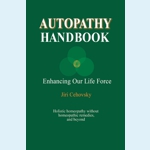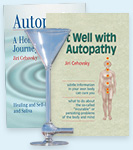Autopathy and renal colic
My husband suffered since his youth with renal colic. In the course of his 58 years he suffered four or five attacks. I noticed that he always got the attacks when he was in a stressful situation.
Before examination at the university, during the army service, then in his first job which did not correspond to his education, but as did not want to join the party he had to give up profession. He studied at the Philosophical Faculty of Charles University the subject antiquity and classical philology, but worked at reloading at the main railway station in Prague.
The next colic attack came, when after the revolution he had lost his job in the newspaper and about a year ago, when in his present working place radical personnel changes started.
Every time the attacks were very dramatic, at the beginning he tried to help himself with Cystenal, but it usually did not help, or it only reduced the sharp pain which lasted even so several hours. Usually his colleagues brought him to the hospital for calcium or other injections. He did not even know that he was taken there. He was beside himself as he said.
Last year he fortunately got the attack after he had returned from work and I was at home. I already had a year’s experience with using autopathy in self-healing.
At first, he stubbornly asked for Cystenal. But this is no longer produced and all we had at home was a small rest. I tried to stop him from using it, but he insisted and drank it. Within 5 minutes, he also got sick and vomited. Fortunately I always have at home one reserve autopathy bottle for acute situations. I offered to make him an autopathic solution from saliva. At first he did not want to, he maintained that in this painful situation he will not do such stupid things as pitting in some kind of a bottle. I persuaded him and finally, with great revulsion and full of mistrust, he spat. I diluted the saliva with 5 l bottled water. Being aware of the danger of contamination of the preparation, I covered my mouth with a protective mask. I applied a drop of the preparation on the third chakra and also to the mouth, so that he had the impression of taking a medicine.
In 10 minutes he said that the sharp pain passes, but the strong pressure in the area of left kidney remains. After half an hour he could get up and had to admit (very unwillingly) that the attack had passed.
Therefore, while in the past the attack lasted almost the whole day, it now passed within half an hour. Nevertheless, he continued maintaining that the reason for the attack passing so quickly was probably that the attack did not have the usual intensity. I did not oppose to him, he has to come to terms with it himself.
He developed a ritual – after the attacks he took a bath and soaked himself in the warm water for about an hour, also this time, but first on the second day after the attack. When he got out of the bath, I have found a small stone in it. I have showed it to him, he did not believe his eyes. He did not feel it leaving him. His doubts continued, but the stubbornness weakened.
In about 14 days, after he had soaked himself again in the bath, he found, luckily, further two little stones. This time he finally believed that they are his and not smuggled there by me. He immediately phoned me to tell me about it, I was in the mountains away from home.
Since then I have made autopathy for him 2x, this time from breath, but he already asked for it himself, when he felt that something in his body is causing him discomfort. For example he got a backache or pain in the neck or in the stress his voice changed to higher tones. After autopathy he always felt better.
He accepted this method, he does not comment on it, does not defend himself and accepts my health advice. He even advises colleagues at work when they have some health problems. He tells me about it at home first, I tell him that it is most likely so and then he tells them on the next day. And so a fundamental shift had taken place also in his mental sphere.
Subscribe for news!
Insert your e-mail and we will send you a note when new article is published.



